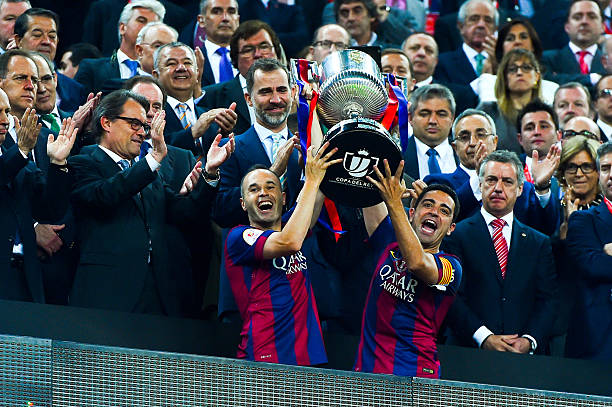While many players rely on speed or strength, Xavi Hernández ruled the pitch with intelligence, vision, and elegance. Often called the “puppeteer” of Barcelona and Spain, Xavi didn’t just pass the ball—he controlled the entire rhythm of the game.
With a career full of brilliance and leadership, Xavi’s legacy goes far beyond trophies. He redefined what it meant to be a central midfielder and helped build one of the greatest dynasties in football history.
Here are six genius moments that showcase why Xavi Hernandez will always be remembered as the mind behind modern football.
1. The La Masia Prodigy – Early Days at Barcelona
Born in Terrassa, Catalonia, Xavi joined FC Barcelona’s famed La Masia academy at just 11 years old. Even as a youngster, coaches noticed his calmness on the ball, incredible awareness, and precision passing.
He made his first-team debut in 1998, stepping into a midfield that once belonged to Pep Guardiola. Over time, Xavi Hernandez would not only fill those boots—he’d create his own legacy and become the heartbeat of Barcelona’s system.
His rise was a symbol of the club’s belief in nurturing intelligence and technique over physicality, and he carried that philosophy throughout his career.
2. Tiki-Taka Master – The Guardiola Revolution

Under manager Pep Guardiola, Barcelona entered a golden era (2008–2012), and at the center of it all was Xavi Hernandez. Playing as the orchestrator of tiki-taka, Xavi Hernandez completed more passes than anyone in Europe—often with 90%+ accuracy.
His connection with Iniesta and Busquets became legendary. Xavi Hernandez didn’t just keep possession; he dictated tempo, broke defensive lines, and made everyone around him better.
During this period, Barcelona won:
- 3 La Liga titles (2009, 2010, 2011)
- 2 UEFA Champions League titles (2009, 2011)
- Multiple Copa del Rey, Super Cups, and FIFA Club World Cups
Xavi’s play wasn’t flashy—it was flawless. Every touch had purpose. Every movement created space. He made football look effortless, but it was a product of genius-level thinking.
3. Euro 2008 – Spain’s Midfield Revolution Begins

Before 2008, Spain had a reputation for underperforming in major tournaments. That changed when Luis Aragonés handed the keys to the midfield to Hernandez.
In UEFA Euro 2008, Xavi was named the Player of the Tournament. His control, short passes, and calm leadership turned Spain into an unstoppable force. He was the metronome of a team that included Fabregas, Iniesta, Silva, and Torres.
Spain won the final 1–0 against Germany, but it was their passing dominance throughout the tournament that stunned the world—and Xavi was the architect.
That win marked the beginning of a historic three-tournament run that would redefine international football.
4. World Cup 2010 – Xavi at His Peak

Spain’s 2010 FIFA World Cup victory in South Africa was built on a philosophy of patient, intelligent football. Xavi averaged over 100 passes per game, setting records in possession and influence.
Although he didn’t score or provide many assists, his impact was clear: Spain controlled every match, often frustrating opponents into submission with precision passing.
Spain beat the Netherlands 1–0 in the final thanks to Iniesta’s goal, but it was Xavi who silently conducted the orchestra, making sure every play began and ended with control.
Many consider that Spanish squad the greatest international team ever—and Xavi was its soul.
5. Champions League Final 2011 – A Masterclass at Wembley

The 2011 Champions League final between Barcelona and Manchester United at Wembley is widely regarded as one of the best team performances in history.
Barcelona dominated with 68% possession, and Xavi completed 136 passes—more than the entire United midfield combined. He ran the show, assisting Pedro’s opening goal and completely nullifying United’s threats.
Even Sir Alex Ferguson admitted, “They gave us a hiding.” Xavi’s ability to control high-pressure games on the biggest stage is what separated him from the rest.
This final wasn’t just a win—it was a demonstration of football perfection, and Xavi was at its core.
6. Farewell and Future – From Player to Coach

After winning everything at both club and international level, Xavi played his final game for Barcelona in 2015, lifting the Champions League and La Liga one last time. He finished his career at Al-Sadd in Qatar, where he later became a coach.
In 2021, he returned to Barcelona as head coach, aiming to restore the club’s football identity. His tactical intelligence, experience as a player, and leadership have made him one of the most promising young managers in Europe.
Whether on the field or on the sidelines, Xavi continues to influence football with the same calm brilliance he always possessed.
Xavi Hernández – A Football Mind Like No Other
Xavi’s career wasn’t defined by highlight reels—it was defined by flawless execution, leadership, and vision. He didn’t score the most goals or make the most tackles, but he understood the game like few ever have.
He showed that intelligence could dominate in a physical sport, and that success could be built not on chaos, but on clarity, patience, and trust in technique.
Quick Facts About Xavi:
- Full Name: Xavier Hernández Creus
- Date of Birth: January 25, 1980
- Position: Central Midfielder
- Clubs: FC Barcelona, Al-Sadd
- Major Honors:
- 8x La Liga
- 4x UEFA Champions League
- 2x European Championship (2008, 2012)
- 1x FIFA World Cup (2010)
- Caps for Spain: 133
Final Thoughts – The Maestro of the Midfield
Xavi Hernández didn’t just play football—he understood it better than almost anyone ever has. He made the complex simple, the hard look easy, and the beautiful even more elegant.
His legacy will always be one of brilliance without arrogance, of excellence without ego. As a player and now as a coach, Xavi continues to shape the future of football—not with noise, but with genius.
For More: Click Here
